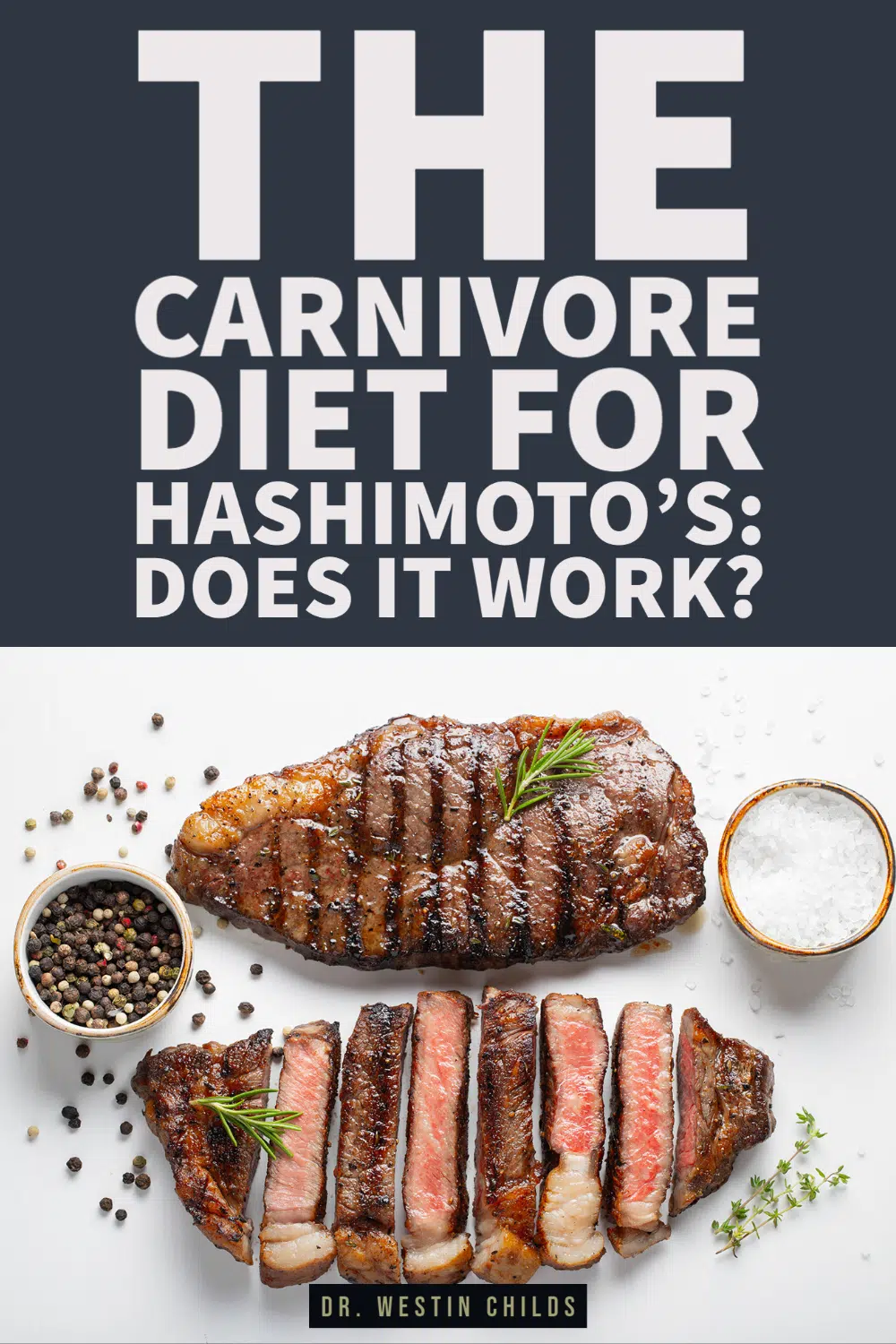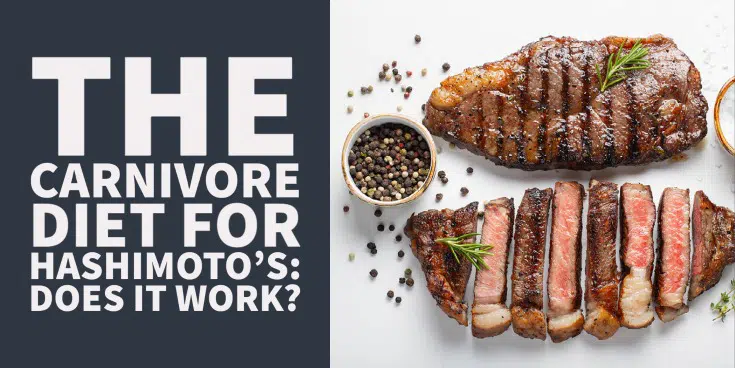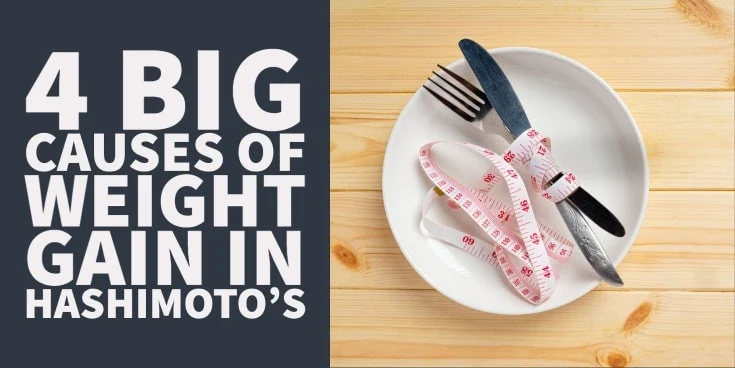It’s well known that diet has the potential to positively impact Hashimoto’s thyroiditis.
You probably aren’t going to cure your Hashimoto’s with diet alone, but no one would argue that changing your diet won’t have some positive impact on both thyroid function as well as your immune system.
And, because it’s one of the things that you can control 100%, it’s of great concern to those people who suffer from this disease.
This brings us to a relatively new diet known as the carnivore diet. It’s been around for a while but it’s only recently gained a lot of media attention.
This diet, high in animal-based products, has helped some individuals with autoimmune diseases and Hashimoto’s.

Could the carnivore diet act as a silver bullet for those people struggling with Hashimoto’s?
Not exactly, but it’s definitely worth a discussion about the potential pros and cons to determine if it’s worth something you should try.
DOWNLOAD FREE RESOURCES
Foods to Avoid if you Have Thyroid Problems:
I’ve found that these 10 foods cause the most problems for thyroid patients. Learn which foods you should avoid if you have thyroid disease of any type.
The Complete List of Thyroid Lab tests:
The list includes optimal ranges, normal ranges, and the complete list of tests you need to diagnose and manage thyroid disease correctly!
Carnivore Diet Basics
The carnivore diet has become popular in recent months (especially within the last year) due to success stories from patients.
Beyond the success stories, there have also been severe criticism of the diet as well.
If you’ve never heard of it, let this information help bring you up to speed.
This isn’t going to serve as a complete run-down on this diet but only as a brief introduction.
If you elect to use this diet you will probably spend much more time looking at recipes and meal plans in the future.
But, for starters, here is a list of foods that are included in this diet:
- Beef
- Steaks
- Roasts
- Organ meats
- Eggs
- Dairy (butter, heavy whipping cream, and hard cheeses)
- Water, Coffee, Tea, Bone Broth
As you can see, the diet focuses heavily on meats but does allow for a small amount of dairy.
But, because of sensitivities to dairy from many people, it’s often better to only add these foods in at a later date once you’ve transitioned into the diet.
Aside from the foods listed above you are pretty much supposed to avoid all other foods, beverages, seasonings, alcohol, and so on.
In terms of food quantity, your main goal should be to eat until you are full and to only eat when you are hungry.
In this way, you are letting your metabolism and appetite signals guide your feeding (1).
One potential benefit to using this strategy is that your body will automatically calculate your caloric needs based on your metabolism (which is very helpful for those suffering from weight-related issues from Hashimoto’s and a damaged metabolism).
Even if you aren’t using this exact diet, this strategy of matching your food intake to your appetite is a great idea.
So that’s the rundown of the diet, but our main question is this:
Does it actually work for Hashimoto’s?
Does it Help Hashimoto’s?
Generally, I like to see a moderate amount of research before I recommend any type of diet to those suffering from Hashimoto’s.
But I’m fully aware that certain things are just not likely to be studied intensively due to a variety of reasons.
While the carnivore diet doesn’t have a large body of evidence supporting its use, that doesn’t mean it should be completely disregarded.
Before any clinical studies are undergone on any therapy there must be someone who supports or advocates for the therapy and shows that it can be efficacious.
Then, once this is done, further studies can confirm suspicions or anecdotal evidence.
Right now, we really only have this anecdotal evidence to work with, for better or worse.
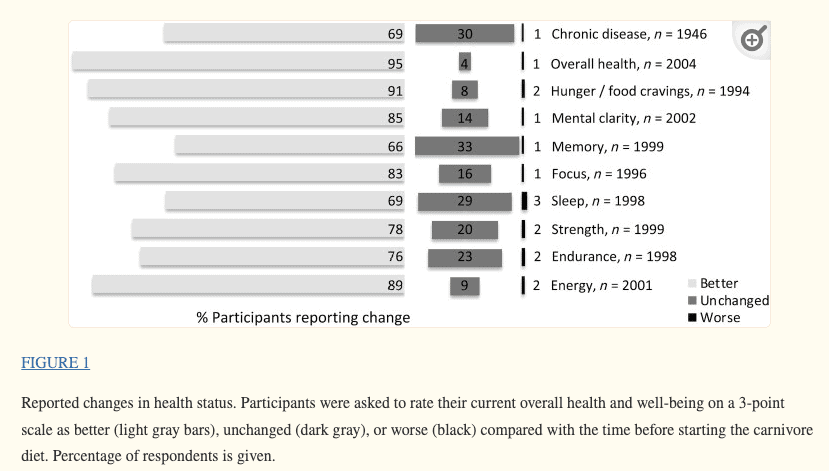
But, surprisingly, there are some people, specifically with Hashimoto’s thyroiditis, who have found significant relief using this diet.
Relief from these individuals has come in the way of improved weight loss and symptoms which may be indicative that their thyroid function has potentially improved (increased hair growth and so on).
This certainly doesn’t guarantee that the carnivore diet is helpful for Hashimoto’s thyroiditis specifically, but it does raise a few questions:
First, is this diet worth exploring if you have Hashimoto’s thyroiditis?
Second, if it is working, how does it work?
Third, if it is effective, what can we learn from this diet?
And fourth, is this type of diet safe?
How Does it Work?
It’s not actually clear how this diet works, but there’s no denying that some people on the diet are finding significant relief.
But this begs the question:
How does it work?
I’m not 100% sure (I don’t think anyone is), but if I had to guess then I would suspect that the major mechanism by which this diet produces significant results has to do with how it influences your intestinal tract and the gut microbiome.
It’s well known that the locus for the development of Hashimoto’s (and other autoimmune diseases) likely starts in the gut (2).
A disordered gut microbiome (changes to the bacterial concentration in your gut) can precipitate damage to your intestinal lining which may result in ‘leakage’ of bacterial products into the bloodstream.
These products can then trigger an immune reaction and result in autoantibody production through a process known as molecular mimicry.
Beyond this, we also know that inflammation in the gut can interfere with immune signaling, alter neurotransmitter levels, allow inflammatory products to enter the bloodstream, and so on.
With all of this in mind, if it were possible to target and fix many of these issues, would it help your autoimmune condition?
The answer is probably yes, at least for the majority of you reading this and perhaps that is how the carnivore diet is helping.
You’re also necessarily cutting out the bad portions of the Standard American Diet including wheat, soy, gluten, and processed foods.
The carnivore diet happens to fit all of the following criteria:
- Low FODMAPs (3)
- Low Oxalate (4)
- Low Lectin (5)
- Low Sulphite (6)
- Low Carbohydrate (7)
- Low Salicylate (8)
- Low Phytate
- Low/no fiber
In this way, the carnivore diet may be acting as the ultimate elimination diet for many people.
And we know that the elimination diet can have profound effects on the body (9), especially for certain individuals.
We also know that other diets which exclude these food groups have also been beneficial for those with Hashimoto’s including diets such as the AIP diet, strict paleo, the gluten-free diet, and so on.

It’s possible that the carnivore diet allows for the healing of the intestinal gut tract, normalizes hormones such as insulin, the balancing of bacterial species in your gut, and the reduction in inflammation or immune regulation systemically.
This may be achieved through a process that mimics the fasted state simply because it alters where food is being digested in the intestinal tract.
All of this is hypothetical, however, because it hasn’t been well studied, but I’m speculating that it may work through these mechanisms.
Long-Term Safety
Before you start this diet you should be aware that there are no long-term studies that show that this diet is safe or effective long-term.
This doesn’t mean that you shouldn’t use it, but it does mean that you should proceed with caution.
It would be less than ideal to find out that you are one of the people experimenting with their bodies only to find that this diet is associated with long-term issues down the road.
As I mentioned previously, just because the carnivore diet may have a positive benefit on your immune system does not mean that it has a positive effect on other systems in your body.
Among those which may be compromised includes your cholesterol system and the absorption of certain nutrients.
While the connection between dietary saturated fat and heart disease has been contested over a long period of time, it’s probably not a good idea to personally test this data and consume massive amounts of dietary saturated fats.
Some meta-analyses (10) conclude that dietary fat is potentially harmful to your body as it may lead to an increased risk of heart disease and/or stroke.
So, while this diet may be helpful for your immune function, are you willing to trade the potential risk of cardiovascular disease for a reduction in your symptoms?
Some of you might answer yes, and that’s a personal decision you might have to make.
Also, it’s worth pointing out that utilizing the carnivore diet temporarily may allow you to reduce gut inflammation, and promote healing in the intestinal tract, which may allow you to transition to a different type of diet that is more balanced.
If you are using the diet in this way then you may be able to mitigate any long-term safety issues.
Finally, another issue worth considering is that of nutrient absorption.
Consuming a diet that is 98%+ in meats is likely to be low in certain vitamins, including vitamin C, vitamin D, iodine, magnesium, and potentially many others (11).
Theoretically, this may lead to a deficiency in these nutrients which may result in unwanted negative symptoms.
This problem can easily be overcome, however, with the use of a multivitamin or other supplementation.
If you opt to use this diet, just remember that you should ensure that you either supplement or ensure that you also are consuming nutrient-dense portions of meat such as organ meats which are incredibly nutrient dense (12).
Meat and Hashimoto’s
If you’ve been reading my blog you know that I’ve previously discussed something called Neu 5 Gc.
Neu 5 Gc is a product found only in animals and some studies have shown that it may be associated with Hashimoto’s (the exact mechanism isn’t clear but you can read more about it here).
If Neu 5 Gc may be bad for Hashimoto’s and it’s primarily found in red meat and animal products then how can the carnivore diet be good?
Well, for many reasons.
#1. The connection between Neu 5 Gc antibodies and Hashimoto’s is still not well understood.
So, even though there is a connection between the two it doesn’t mean that one causes the other or vice versa.
#2. Assuming there is a negative connection, it’s also possible that other factors are still involved which play a greater role in the development of Hashimoto’s.
So, with this logic, even if meat may be bad for your immune function, it’s possible that the elimination diet and its benefit on your body are greater than the negative impact that meat may have.
In this way, you are basically choosing the lesser of two evils.
#3. Neu 5 Gc antibodies do not equally affect all individuals.
Due to a variety of conditions, including genetics, it’s possible (and certainly probable) that even if red meats negatively impact some people, there will always be others who thrive on them.
It’s best to try to avoid reductionist thinking, especially as it relates to diet, as it may force you into a line of thinking which is inaccurate and unhelpful.
Bottom line?
Even if red meats are bad for some people doesn’t mean they are bad for all people.
The Dangers of Low-Carbohydrate Diets on Thyroid Function
This might make some people upset but it may be helpful to think of the carnivore diet as a more restricted version of the ketogenic diet.
I know the diets aren’t the exact same but for purposes of evaluating potential harm, lumping them together can be helpful.
This is because both diets, at their core, don’t allow for any meaningful intake of carbohydrates.
This means that much of the potential harm that comes from the ketogenic diet, as it relates to your thyroid, can be passed on to the carnivore diet as well.
And, as I have discussed in previous articles, there are definitely some potential downsides to the ketogenic diet when it comes to thyroid function.
It’s well known that decreasing carbohydrate intake absolutely has an impact on T3 levels.
The lower your carbs, the lower your T3 will go (13).
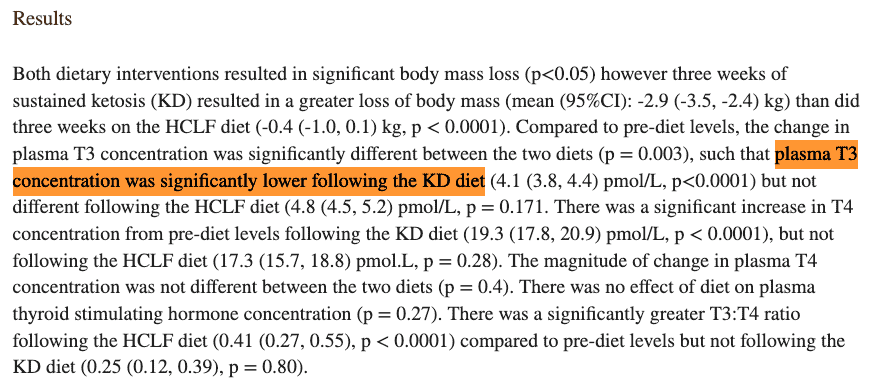
Some people believe that this is a compensatory mechanism and may provide benefits for lifespan, but from the perspective of thyroid patients, even if it can provide benefit to some, that benefit doesn’t extend to people who already have low T3 levels (like many of you reading this).
As a result, low carbohydrate diets are often not ideal for people suffering from low T3 syndrome, euthyroid sick syndrome, or those who are drifting on the edge of hypothyroidism even while taking thyroid medication.
Using low carbohydrate diets in any of these settings may be enough to push you into full-blown hypothyroidism or simply make your existing thyroid function worse.
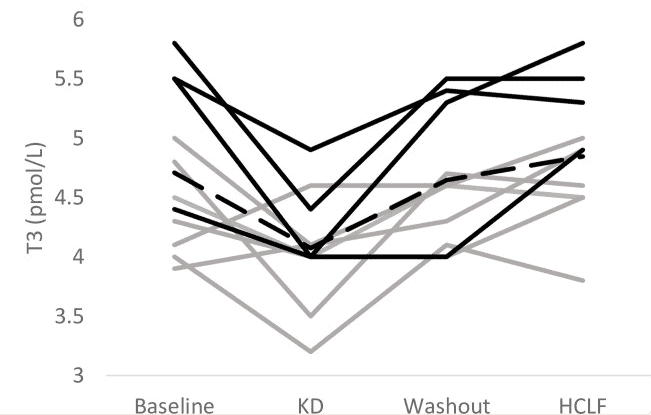
Does this mean you should avoid it? Not necessarily.
As with anything in medicine, you have to take the good with the bad.
In this case, the carnivore diet has the potential to help improve thyroid function by reducing immune damage to the thyroid gland.
But how do you weigh the net effects of something that has the potential to cause both benefits as well as harm?
This is where things get tricky and why it’s always helpful to have something in your corner willing to help you make sense of the noise.
There’s also the argument that losing weight, which the carnivore diet can help with, will positively impact your thyroid.
On the other hand, how are you supposed to lose weight when you are doing something which lowers your T3 level which is one of the primary regulators of your metabolism?
I don’t have an answer for you, at least not one that you’ll like, but these sorts of questions firmly suggest to me that if the carnivore diet is going to be used, it should be used on a temporary and not long-term basis.
Should you Do it?
I am very sympathetic to those people who are suffering from chronic conditions, including Hashimoto’s, and who have been unable to find help.
I’m well aware of the limitations of the current medical system when it comes to taking care of those with chronic medical conditions, especially autoimmune conditions.
These individuals are often at their wit’s end and just need some relief and they are willing to do drastic things to find that relief.
If you fit into this category then perhaps the carnivore diet is something worth exploring.
But, if you proceed, be cautious and remember that this diet has not been studied long-term so there’s no way to know if it’s actually healthy or not for your body to be in this state.
In addition, because of the many unknowns about the long-term safety of this diet, it’s probably not a good idea to use it long-term.
It may be wiser to use it as a type of elimination diet which then allows you to transition to other foods.
You may also find success using it temporarily to allow for gut healing or a reduction in inflammation in your body.
Utilizing the carnivore diet in this way may allow for a reduction in some of the risks that we discussed previously.
If you are new to Hashimoto’s and you aren’t sure where to start then I would probably recommend that you avoid the carnivore diet.
Why?
Because there are plenty of other diets which include a variety of foods that are more researched and shown to be both safe and effective.
If, on the other hand, you are a Hashimoto’s veteran and have been unable to find help in any of these diets in the past, then it may be worth exploring the carnivore diet (but only for a limited time).
Final Thoughts
Unlike other diets that I’ve discussed in the past, this is one diet that I’ve never recommended to my patients nor have tried myself.
It doesn’t mean that I’m necessarily opposed to it, but I would like to see a lot more information and research about it before I get to that point.
But I would like to hear from you:
Have you tried the carnivore diet or are you currently using it now?
Did you find it to be helpful for your thyroid or Hashimoto’s?
How did it affect you?
Leave your questions or comments below so we can keep the conversation going. I’d love to know if any of you have tried it (or are thinking about trying it) and what your experience has been.
